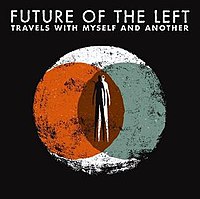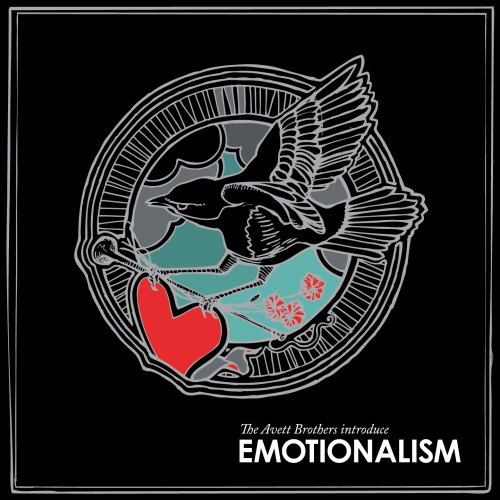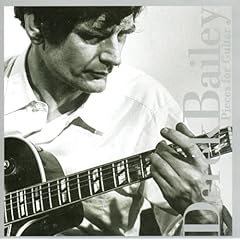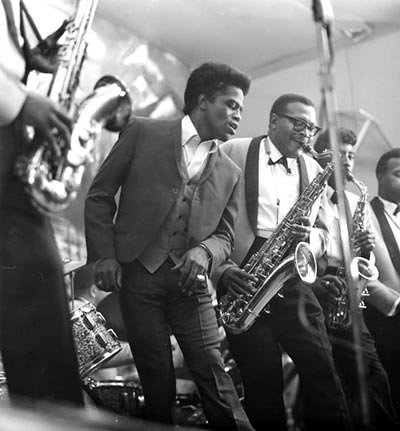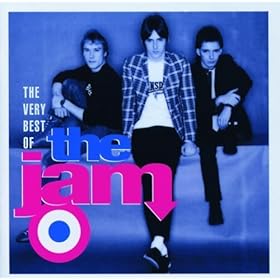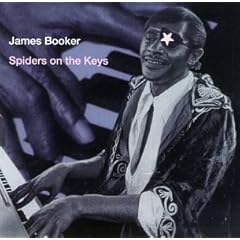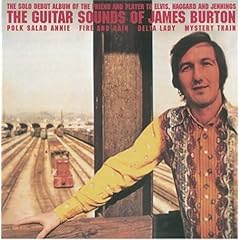It's no longer true to say that no one knows much about Jandek. However, it is still quite true that no one knows all that much about him. The man behind the Jandek phenomenon is one Sterling R. Smith of Houston, TX. When he conducted an interview with the journalist John Trubee in 1985, he mentioned that he was a machinist. At some point before the journalist Katy Vine tracked him down for
Texas Monthly in the late 90s, he became a stockbroker. Vine had drinks with him and some of his co-workers, all of whom seemed affable enough, although she found it weird that they were all dressed identically. Smith stated that he was not Jandek at the time, but the man who has suddenly started playing live shows as Jandek, a man who is clearly Jandek by the sound of his voice and style of his guitar playing, is most definitely Smith.
And there you go: these are most of the known facts about Jandek. But the mystery is compelling because his music is so otherworldly. When artists started making abstract and nonrepresentational art, some people liked to say, "Why, a child could paint that!" But the context of the artist informed the meaning of the art. It's one thing for my 4-year-old to slap paint on paper because he likes the way it looks - in fact, it's an amazingly cool and pure thing for him to do. But for a grown man or woman to do the same bestows additional meaning on the color and shapes. Jackson Pollack's drinking and womanizing give meaning to his paintings whether he meant his life and work to coincide or not. If an ape had thrown all that paint on a canvas, it would be a curio rather than a powerful piece of art. This is how it is with Jandek. His work sounds primitive and childlike - at least at first. But there's a guiding intelligence behind it all, and the glimpses we get of the man behind the Jandek mask give us some necessary context to understand his abstract blues.
To be a Jandek fan is to be a detective of sorts. You must collect and treasure certain facts to help put his music into context. I can't find the exact quote, but recently one of Jandek's collaborators pointed out that while many people think that he makes the music he makes because of his limitations as a musician, he is actually making the music that he sets out to make. I'm not sure that these are actually mutually exclusive ideas. I do think that Jandek of today is a better guitarist than the Jandek of his 80s albums, but I also think that his atonal and arhythmic style is partially the result of his limitations whenever he started recording. On the other hand, it's not an accident for him to be collaborating with avant-garde musicians like Loren Mazzacane Connors, John McIntire, or Alan Licht. His music may be primitive, but it also carries a certain sophistication.
So here's my entry on his 1986 album
Blue Corpse for
Lost In The Grooves, which is apparently part of the Google Books program.
I regret some of the language in that review. For instance, starting with the declaration that Jandek is a "flat-out weirdo" was wrong. Yes, he's strange, but there's something appealing and even a little naïve in his strangeness. I don't want to give readers the impression that they're going to hear anything approaching conventional folk or rock music, but it's not fair to claim that Jandek's sound is utterly alien. True, it can be quite a shock for ear unaccustomed to music of the avant-garde, but that's a far cry from the alien sounds I describe here. I didn't realize at the time, but
Blue Corpse even has a second guitarist playing on it, a guy who knows standard tuning and can fingerpick fairly well. But I'm getting ahead of myself. I should start with the music.
Before I do so, however, I have to give props to
Seth Tisue's definitive Jandek website, the best place on the web to learn about Jandek. He used to have mp3s from out-of-print albums (they're all in print now, so no more), and I recall fondly how I spent an afternoon clicking through song after song, learning how to distinguish between Jandek's different periods. Many, many thanks, Seth.
I should also mention that I know that Smith has been historically averse to being identified as "Jandek," apparently reserving that name for the music product and simply identifying himself as a representative of Corwood Industries, the record label that exists to put out Jandek albums. But I'm too far into the practice of calling him Jandek to stop now.
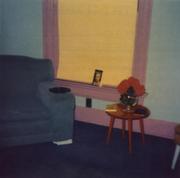 Ready For The House
Ready For The House (1978). In his
album-by-album review on Perfect Sound Forever, Aaron Goldberg theorized that Jandek was influenced by the punk aesthetic, noting the garish day-glo colors on the album cover and the DIY recording. The subject of the cover, an interior view with the shades drawn, is pure Jandek, establishing the what-I-do-is-secret philosophy that seemingly guided Jandek's career until roughly 2004. The music is also pure Jandek: guitar tuned to maximize the plonky strangeness, most songs containing a single chord with strings plucked at random, and Jandek's ethereal ghost-voice, which is simultaneously as breathy as Nick Drake's, as howly as David Thomas's, and as whispery as a breeze.
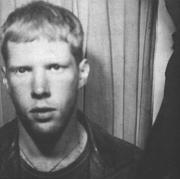 Six And Six
Six And Six and
Later On (both 1981). Wikipedia notes that Jandek is most likely 65 right now, which would mean that when
Ready For The House was released, he would have been 32. And it seems pretty likely to me that his albums are as achronological as the images of the man that grace the covers of his albums. The young man on the cover of
Six And Six looks roughly 20 to me, meaning that this picture was some sixteen years old when Jandek's second album came out. Anyway, these albums are sort of analogous to Dylan's early acoustic-blues albums, albeit only if Dylan were a manic depressive who played a single wacky-tuned chord per song at the speed of molasses.
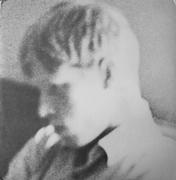 Chair Beside A Window
Chair Beside A Window (1982). This is one of my favorite early Jandek records. It starts with that godawful Jandek chord and the man moaning, "We can't deny there's spirits in this house. You shut the door. The wind closes two more. I laugh a dark laugh." Awesome. Then there's the squall of "European Jewel," an apparently different song than the one with the same name on
Ready For The House, this one with different lyrics and - shock! - drums. Jandek later reveals that he overdubbed the drums himself. This is followed with more acoustic shut-in blues, but then, on "Nancy Sings," a woman - Nancy, we presume - sings. She has a rather Sandy Denny-ish phrasing. Nancy's sister Pat (whose identity we learn from WFMU DJ Irwin Chusid) sings/shouts on the next track "No Break." The appearance of Nancy is a huge piece of the Jandek mythology, although a bit confounding when you consider that we the listeners don't actually know when these songs were recorded.
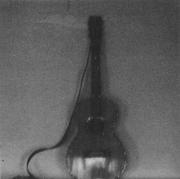 Living In A Moon So Blue
Living In A Moon So Blue (1982) and
Staring At The Cellophane (1982). These albums are almost indistinguishable: nearly identical covers, many of the same themes in the lyrics, every song played on a guitar that is tuned the exact same way and played with the exact same chordal structure. I'm going to put myself out on a limb and guess that they were actually recorded before Nancy became a regular part of Jandek's life. I suspect they were all recorded at roughly the same time, too, because I don't think Jandek's favored acoustic of the time holds a tuning that well, and all of the tracks on both of these albums have the exact same tuning. If he'd spaced these out over a few days, his guitar would sound different on the tracks that were recorded later.
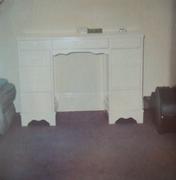 Your Turn To Fall
Your Turn To Fall (1983). More acoustic blues. But there's things that make this different than the prior two albums. First, on "John Plays Drums," Jandek is joined by a drummer named John. It's fair to say that John is not a well-trained drummer, choosing to pound on a single drum at a time with little regard for timing. "John Plays Drums" is the same song that was "Nancy Sings" on
Chair Beside A Window, although with the drums and electric guitar, this version is raucous as hell. "New String" is, literally, the sound of Jandek tuning his guitar after adding a new string. The remainder of the album is played in the tuning he decides upon. He's added a lovely echo to his vocal, though, and most of the rest of the album passes well with some beautiful lyrics and that bizarro tuning. All of the tracks were almost certainly recorded at the same time with no retakes. You can hear the tuning go slightly out over the course of the album, which is exacerbated when on "About Today," Jandek tunes and detunes the strings while he plays and sings a cheery lyrics that is almost Beatles-esque.
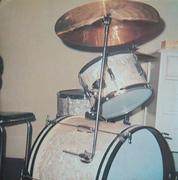 The Rocks Crumble
The Rocks Crumble (1983) and
Interstellar Discussion (1984). Save the first two tracks, the former of these is mostly performed with Jandek on electric guitar and John The Drummer. Three of the tracks are reworkings of "European Jewel." "Birthday" is yet another version of "John Plays Drums"/"Nancy Sings". On
Interstellar Discussion, Jandek and John go hogwild over the first half of the album. John drums like hell, Jandek wrangles his electric as if it hurts him, and Jandek overdubs harmonica on some tracks and a second vocal line on others. The second half of the album is back to acoustic shut-in blues.
Interview With John Trubee (1985). This is a 45-minute recorded interview with the journalist John Trubee for Spin Magazine, with Jandek talking a bit about his life and his work. Jandek comes across as a regular guy in many respects, but he's pretty cagey about his personal life and how he knows John and Nancy. He mentions how much fun he had making
Interstellar Discussion, which leads me to suspect that the collaborations with John were somewhat concurrent with the releases, even though I think the acoustic blues were recorded some years prior. I have no evidence of this, but there's something that's more antiquated about those songs. Jandek mentions that he likes Tom Petty and country radio. He says that his moniker is a combination of "January" and a guy he was talking with named "Decker." And he mentions that he works as a machinist, although Wikipedia notes that he's probably a stockbroker as of the early 2000s. Pretty interesting stuff for those of us who are curious about the guy.
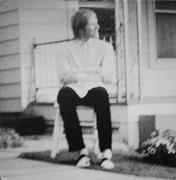 Nine-Thirty
Nine-Thirty (1985).
Nine-Thirty is another all-acoustic and vocals album, but Jandek's guitar playing is more aggressive and strummed on some tracks. His low string is tuned way into the bass register, making a quite pleasing drone. Same open tuning throughout, again suggesting that the songs were recorded around the same time. "Wrong Time," with its frantic strumming, and "This Is A Death Dream," with its creepy lyrics, are the highlights for me.
 Foreign Keys
Foreign Keys (1985). We've heard John. We've heard Nancy. Here we have The Jandek Experience Featuring John And Nancy. The first side is all John and Jandek, cranking out the
Interstellar Discussion-inspired discordant blues. The second side is Jandek & John making music with Nancy on lead vocals. Getting back to my thoughts on time, Jandek would have been 40 the year this came out. He had almost certainly have been recording for some time, and it's certainly possible that not only were the different parts of these tracks recorded at vastly different times, but it could also be that Nancy and John were never in the same room at the same time. I don't have any evidence about this one way or another, but it seems wrong for Jandek to have a lot of friends involved in his project at the same time. His music is so private and personal that the idea of other people gathering to make Jandek albums, especially during this stage of his career, sorta creeps me out. If this were the case, I would think that Nancy's vocals were added later, because they couldn't have been added earlier than John's drums.
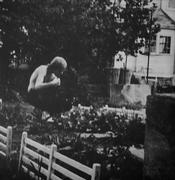 Telegraph Melts
Telegraph Melts (1986). Oh, lord lord lord,
Telegraph Melts is not for people who can't appreciate a goddamn racket. On this record, Jandek has a full band: John on drums, Jandek usually on guitar (but also harmonica and bass), and Nancy singing. Plus there's a guitarist named Eddie, who would come to be a primary singer on a few albums in the near future. For the longest time, I also posited another guy, let's call him Janky, who plays guitar, harmonica, and bass, and who, moreover sings on a number of the tracks on the album. Seth Tisue's site doesn't mention this other guy, but he doesn't sound like Jandek. His voice seems more nasal than Jandek, who is easily identifiable by his breathy whine. And when Janky and Jandek "sing" together on a few tracks towards the end, their voices sound utterly different. Jandek is breathy, but deeper than usual. Janky is aggressive and, as I said, a bit more nasal. After listening closely, though, and comparing this album with the interview and the next few albums and the more recent albums, I had decided against the existence of Janky. Janky is just another voice made by Jandek. I think the breathy Jandek voice up until this point is an affectation, which is another reason I suspect that the recordings are not being released in any sort of chronological order. Besides being totally fucking committed to bellowing his vocals here, Jandek/Janky sounds like a roughly 40-year-old man on this album, and the breathy early Jandek voice sounds like the work of a younger man. The core of the band - Jandek and John - are playing together at the same time, but I suspect that the vocals were dubbed at a later time. And MAN what a disturbing album. So Nancy is singing all over the album, but Jandek/Janky dominates the second side. Here's my speculative line-up on this album. John on drums on every track. Jandek on guitar, except where noted. "You," "On The Planes," and "Go To Bed": Nancy singing. "Ace of Diamonds" and "Twenty-Four": Jandek singing. "No Slow Ones": Jandek on bass (I think), some other guy (Eddie, perhaps?) on guitar (my evidence: this guy plays single note leads and bends notes constantly, neither of which is particularly like Jandek, nor similar to the guitar anywhere else on the album), Nancy sings. "Telegraph Melts": Nancy sings, Jandek with overdubbed harmonica. "Governor Rhodes": I think this is Eddie on lead vocals with Nancy. It sounds more like his vocals on later albums than it sounds like Jandek. The problem is that he also sounds like the same guy that did the interview with John Trubee, which throws that whole interview into doubt. Maybe it was Eddie who was the machinist. Who knows?m "Star Up In The Sky": vocals definitely overdubbed with Jandek/Janky on harmonica and vocals, Nancy on vocals. "You Painted Your Teeth": Jandek/Janky on vocals. "Mothers Day Card": overdubbed Jandek vocals in both young Jandek breathy style and older Janky shouty style along with overdubbed harmonica. "The Fly": breathy Jandek (in the right ear) moaning, Janky on lead vocals. "House Up On The Hill": Jandek and Nancy on vocals with overdubbed harmonica and maybe bass.
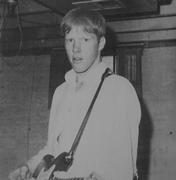 Follow Your Footsteps
Follow Your Footsteps (1986). After the aggression and new voice of
Telegraph Melts, this assertion seems unlikely, but
Follow Your Footsteps opens with one of the most surprising starts in the Jandek catalog: a conventionally-tuned guitar playing a D chord. I'm going to use Occam's Razor here and suggest that this more conventional guitarist is Eddie, who is also the person who sings "Jaws of Murmur," the third song. I'm also going to use Occam's Razor to suggest that John does not play drums on this album. The first two songs are instrumentals with Eddie on guitar and a frantic drummer, who is, I believe, Jandek himself. The fourth song, "Preacher," which has the younger breathy Jandek vocals and a second guitar that is almost definitely Jandek's scratchy electric style. Breathy Jandek and Eddie both have vocals on "Don't Ask Why," which features Eddie's guitar exclusively. "Leave All You Have" has both Eddie and Jandek on acoustics, with Eddie playing relatively straightforward blues while Jandek brings the shut-in skronk. "I Know You Well" has no Jandek guitar and could pass for a Palace/Will Oldham track. Jandek's picking with Eddie again on "Dearly Need Some Words," which has no vocals. One of these songs, and I forget which, has Jandek singing over Eddie tuning his guitar. "Straight Thirty Seconds" and "Bring On Fatima" are are electric Jandek and Eddie, I suspect, on drums. Eddie can actually keep a beat. "For Today," "Collection," and "We're All Through" are classic Jandekian shut-in acoustic blues.
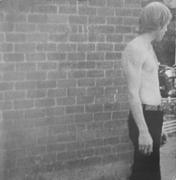 Modern Dances
Modern Dances (1987). By the sound, this was recorded around the same time as
Telegraph Melts. Jandek is in Janky-shout mode. Nancy is singing. John plays drums. Jandek goes electric. "Painted My Teeth" is a companion to Telegraph Melts' "You Painted Your Teeth." I have my suspicion that these songs are obliquely fear-mongering about the horrors of fluoridation. This album is pretty goofy, even by Jandek standards. On "Number 512," Nancy sings about changing "the pace" of the song and insults John the drummer for not responding quickly enough. Then she and Jandek howl about God for the next couple of songs. "I Want To Know Why" has Eddie joining Jandek and Nancy on crazy back-and-forth vocals. The album wraps up with more of the Jandek alone-with-his-acoustic blues. You know what would be really freaky? If Eddie and John and Nancy were all still there when Jandek recorded those last few songs, listening to the man play his spooky-tuned guitar and moan about life.
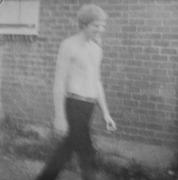 Blue Corpse
Blue Corpse (1987). For the first three songs, it's Jandek on guitar, Eddie on vocals, singing some of the saddest lyrics in the world. No Nancy. Then Eddie on guitar and Jandek on vocals (and unaccompanied harmonica) until the last song. After listening to not much other Jandek, this album sounds like an uncompromising vision of post-breakup depression. After listening to the entire oeuvre to this point, this sounds like his
Rumours, a pop masterpiece in comparison to, say,
Telegraph Melts. Eddie is named during "Down At The Ballpark," when Jandek calls out, "Take it, Eddie." Still my favorite Jandek album. Sample lyrics: "You took my success/Can you take my failure?"
 You Walk Alone
You Walk Alone (1988). Wait, did I compare
Blue Corpse to
Rumours? Then this one is, I don't know, the Velvet Underground's third album? Two gorgeous, clean electric guitars playing roughly in tune throughout. I suspect both are Eddie or maybe there's another guitarist we don't know about. Random drumming that seems rhythmically related to the guitar's music. Jandek singing - in his breathy voice - beautifully throughout. Wonderful lyrics, often recalling some of his best songs from the prior albums. Absolutely wonderful, and maybe even accessible to people who would normally hate Jandek. Nah, I'm just kidding about that.
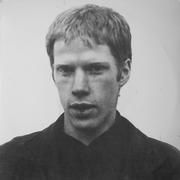 On The Way
On The Way (1988) and
The Living End (1989). Both of these have some of the same subdued quality of
You Walk Alone, but both are a little more raucous than that album. Eddie is again on guitar through most of both albums, playing some of the most conventional blues that appear on any Jandek album. Eddie also sings many of the songs on the first one.
On The Way even has another male singer on two songs! Maybe this guy is the same one who sang "Governor Rhodes" on
Telegraph Melts. I called it for Eddie a few paragraphs back, but now I'm not quite so sure. On the first, Jandek is still breathy, still not using the more shouty Janky-style singing.
The Living End features some of the shouty Janky vocals.
On The Way has another version of "Message To The Clerk," which originally cropped up on
The Rocks Crumble. And
The Living End has Nancy back. Or maybe her sister Pat. I can't tell.
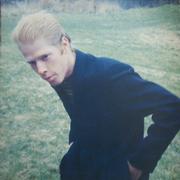 Somebody In The Snow
Somebody In The Snow (1990) and
One Foot In The North (1991)
. Somebody In The Snow starts with four songs with two guitarists, one of whom is probably Eddie and one who is maybe this other, unnamed guy. Either Nancy or Pat is singing and Jandek is on drums. Then there's "OM," which is an a capella piece that is maybe the most radical song in the Jandek catalog to this point. Lots of different voices singing the word "Om" at different pitches and rates and some seem slowed-down and some speeded-up and there's echo on several. The whole effect is otherworldly and beautiful and a little disturbing. After "Om," I think some of the rest of the album is multitracked Jandek solo. First, though, there's "Bring It In A Manger" has a wheezy harmonica, an interesting "dum da da" backing vocal track, and a classic breathy Jandek lead. Then "Walking Around" is the same band from the first four tracks. "Sense of Reason" is all Jandek, with a Jandek acoustic and vocal in the left ear and what is probably Jandek on drums in the right ear. "Remind You" confirms this, with the left ear guitar and vocal that do not match the drums and vocal in the right ear. The rest of the tracks are also multitracked Jandek. Sometimes the left ear has acoustic guitar, sometimes electric, sometimes harmonica, but the right ear is all drums, all the Jandek way.
One Foot In The Grave starts with Jandek on electric and vocal with no accompaniment, but there are also several tracks that sound like Eddie and Jandek are switching out on drums and guitar.
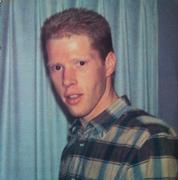 Lost Cause
Lost Cause (1992). Jandek and Eddie again. Jandek does the first song solo. Then Eddie plays some more conventional guitar on the next four songs while Jandek sings. Then Jandek is back to his crazy-tuned guitar and singing for the next two songs. The recording fidelity is terrible on those two, leading me to believe that they were recorded before the previous five songs. Then there's "The Electric End," which has one guitar, drums, yelpy vocals, and some sort of whistle for some 18 minutes of boom-bam-skronk-howl. I'm sure there's some Jandek fans out there who really enjoy this, but it seems so aggressively anti-musical that I've never sat through the whole of it.
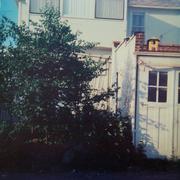 Twelfth Apostle
Twelfth Apostle (1993),
Graven Image (1994), and
Glad To Get Away (1994). Back to the shut-in acoustic blues. The lyrics on
Twelfth Apostle mostly fail to engage me, although I may be suffering from Jandek fatigue at this point. Seth Tisue calls
Twelfth Apostle the beginning of Jandek's late period and states that all three of these have more connection to the albums that came after instead of the ones that came before, but I suspect that he formed that opinion one album too soon. The twelfth apostle was Judas, and I guess it is somewhat interesting to hear Jandek wrestle with his faith.
Twelfth Apostle also adds a cool delay effect to his guitar (maybe an Echoplex or Electro Harmonix 16 Second Delay pedal, given the pinging sound), making "Could Be Anyone," the first song where it appears, the highlight of that album. But the real different starts with
Graven Image, which has Jandek using his older Janky voice much more frequently. When he used this voice in the past, it was almost always on loud songs, but here he uses it with quiet acoustic songs. The guitar tuning is similar to prior Jandek albums, but the playing is different. Where in the past he would pick around a single chord structure, on
Graven Image his songs have a lot more movement to them. Some tracks are performed on accordion, which has never appeared on a prior Jandek album. He's a pretty competent accordion player to my ear. "Janky" is a tune of harmonica and silly rhymes about how clanky that Janky is. It's also, as should be clear, where I got the Janky moniker for his older voice.
Glad To Get Away is similar to
Graven Image, and that's a good thing.
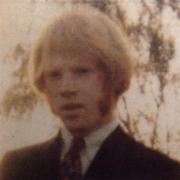 White Box Requiem
White Box Requiem (1996) and
I Woke Up (1997).
White Box Requiem sounds like it was recorded before the last two albums. Here's my theory: all of the previous recording - save
Graven Image and
Glad To Get Away - were actually recorded in the early to mid 1980s. There was a flood in Houston in 1994, and some of Jandek's recordings were damaged. He cut
Graven Image and
Glad To Get Away right away, which is why his voice sounds more mature on those records (he was, after all, some 50 years old in 1995).
White Box Requiem was on a tape he found while working his way through the mess. It's not a bad album, being a concept album of sorts about death, but it seems like a definite step back into the sound of 1985's
Nine-Thirty. I have no theories about when
I Woke Up was recorded. The vocalist on most of the early tracks is a man we haven't heard before who dryly declaims the lyrics on each song. Seth Tisue thinks that the guy (who might be named "Mike") is doing a Jandek impression on "Long Long," but I disagree. I think that's Jandek as an older man. "Long Long" and "Joab" have drums, and it sounds like Jandek's style of drums, which is somewhere between John's bash-the-shit-out-of-them method and Eddie's somewhat-shy-of-four-on-the-floor method. Lots of harmonica, some accordion, and tons of echo-ey effect on the guitar. The lyrics are more menacing than usual, and that's saying something. "Pending Doom" is Mike reciting lyrics while Jandek pounds on what sounds like a rubber bucket. Stand out!
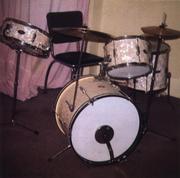 New Town
New Town (1998) and
The Beginning (1999).
New Town is another album that could have been recorded pre-flood. Lots of acoustic shut-in blues recorded with heavy tape hiss. That hiss may be the result of the recording process or it might be water damage. Jandek's guitar playing, however, is rather expressive, more like his post-flood recording. His voice has that high breathiness of the younger Jandek, though. So hell, I don't know. Maybe he's a time traveler. Or maybe the voice is just an affectation. Decent songs, all with (and I just noticed this) different tunings. His older acoustic albums were all recorded with his guitar in the same tuning, but it changes often on this album. I hereby present the possibility that everything I've thought true about Jandek could be wrong. The first half of
The Beginning is much like
New Town, albeit without the tape hiss. Lots of Jandek acoustic guitar, lots of Jandek singing. The second half is a single 15-odd-minute piece without vocals on what Seth Tisue describes as "an almost confrontationally out-of-tune piano." He's not kidding.
 Put My Dream On This Planet
Put My Dream On This Planet (2000),
This Narrow Road (2001), and
Worthless Recluse (2001). Then Jandek made three albums of spoken-word half-sung/half-drunken rant poetry. The first one had two 20+ minutes tracks and one that was just over a minute. Jandek's voice sounds more natural, less breathy, and you can hear quite a bit of East Texas in his accent. The second starts with a near-half hour track, but follows it with 11 much shorter tracks. And the third one has a 17-minute track, but the rest are considerably shorter. These albums are surprisingly arresting, for being essentially the freeform ramblings of some guy in Houston.
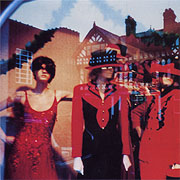 I Threw You Away
I Threw You Away (2002),
The Place (2003), and
The Gone Wait (2003). Jandek's using his more mature Janky-style voice full-time now. The first two both contain longer songs with that distinctive Jandek guitar. His voice has completely lost the breathiness, but he yelps and croons and howls much more often now. This is also the first lacuna in my Jandek collection, as I don't have a copy of 2002's
The Humility of Pain, which was released after
I Threw You Away. I like the more recent Jandek guitar sound, but I also get tired of it a little more quickly than I do with the older albums. The Gone Wait has songs similar to these other two albums, but Jandek accompanies himself with a fretless bass throughout. This is a surprisingly great match, but I have yet to pick up the other albums where Jandek plays bass.
Missing:
The Humility of Pain (2002),
Shadow of Leaves (2004),
The End Of It All (2004),
The Door Behind (2004),
A Kingdom He Likes (2004), and
When I Took That Train (2005).
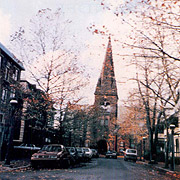 Glasgow Sunday
Glasgow Sunday (2005),
Austin Sunday (2006), and
Glasgow Friday (2008). Then in late 2004, Jandek began to play live shows. Glasgow Sunday is the first of these, recorded October 17, 2004 with Richard Youngs on bass and Alexander Neilson on drums. His rhythm section is excellent and Jandek plays slashing, howling guitar. The dynamic is slightly different on Austin Sunday, which captures his first North American show on August 28, 2005. Bassist Juan Garcia has some great back-and-forth with Jandek (and his style is a little more angular than Youngs's throbbing bass at the Glasgow show) while drummers Nick Hennies and Chris Cogburn played off of each other, making a beautiful wild sound. I was at this show. I can hardly listen to the live release, though, because I think I prefer my memories of what it was like. Glasgow Friday is a document of Jandek with Youngs and Neilson as his rhythm section again on October 14, 2005. I should point out that while all of the live albums I have feature Jandek on electric guitar, he has also been known to play acoustic, bass, keyboards, and piano live. This is clearly the older Jandek, which helps to date all of the recent releases as also being recently recorded. There is a clear continuum with the music that he has made since he released the three spoken word albums. All of his studio (well, non-live) albums since the turn of the century have featured voice (the older, more mature voice) and a single instrument.
Missing: Raining Down Diamonds (2005), Khartoum (2005), Khartoum Variations (2006), Newcastle Sunday (2006), What Else Does The Time Mean (2006), Glasgow Monday (2006), The Ruins Of Adventure (2006), Manhattan Tuesday (2007), and Brooklyn Wednesday (2007).
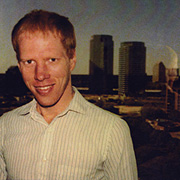 The Myth of Blue Icicles
The Myth of Blue Icicles and
Skirting The Edge (both 2008). These are the only two later non-live albums that I have (I really am getting hung up on the use of the word "studio" to describe these, although they clearly were recorded in a studio with decent equipment, so I'm just an idiot, I guess). Both are acoustic guitar and vocals, and both feature songs that range from sorta long (5 - 7 minutes) to really, really long (23+ minutes). Both sound pretty similar to the recent Jandek work I've heard, but, as it should be clear by all the missing albums I'm posting, he's been quite prolific in the past decade. If I were more familiar with those other albums, perhaps I could hear more differences between them.
Missing: Glasgow Sunday 2005 (2008), London Tuesday (2008), Hasselt Saturday (2009), Helsinki Saturday (2009), and Not Hunting For Meaning (2009).
That's 22 Jandek albums that I don't have. All of the live ones (which are uniformly named for the place they were recorded and the day of the week) have had DVD releases, too, except for the two most recent ones from Scandinavia. Whew! That's a little over a week I spent listening to a hell of lot of Jandek. I have a few more thoughts on the man, but I'm going to need a little time to let them finish percolating.
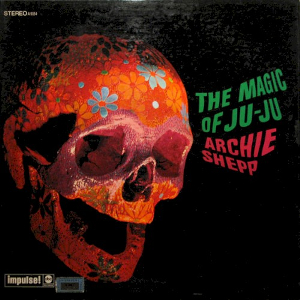 Archie Shepp - The Magic of Ju-Ju (1967). Sounding somewhat like Coltrane's final albums, the first track on this album is 18+ minutes of Shepp chasing his bliss while a small army of drummers provides a polyrhythmic foundation. When the rest of the band joins with bass and two more horns, Shepp sounds just as driven and intense. Top-freakin'-notch.
Archie Shepp - The Magic of Ju-Ju (1967). Sounding somewhat like Coltrane's final albums, the first track on this album is 18+ minutes of Shepp chasing his bliss while a small army of drummers provides a polyrhythmic foundation. When the rest of the band joins with bass and two more horns, Shepp sounds just as driven and intense. Top-freakin'-notch. Dirty Projectors - Rise Above (2007). A friend suggested this to me. I haven't been on the Dirty Projectors bandwagon. Although I heard a couple of singles on the KEXP podcast that piqued my interest a bit, I was a little concerned that the afrobeat feel on these songs would strike me as empty as Vampire Weekend on a full-length. But this album, an attempt to recreate Black Flag's Damaged from memory as a somewhat-oversung worldbeat-pop-folk thing, is pretty damn creative and fun. I should have checked them out earlier.
Dirty Projectors - Rise Above (2007). A friend suggested this to me. I haven't been on the Dirty Projectors bandwagon. Although I heard a couple of singles on the KEXP podcast that piqued my interest a bit, I was a little concerned that the afrobeat feel on these songs would strike me as empty as Vampire Weekend on a full-length. But this album, an attempt to recreate Black Flag's Damaged from memory as a somewhat-oversung worldbeat-pop-folk thing, is pretty damn creative and fun. I should have checked them out earlier. 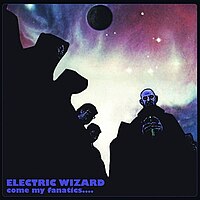 Electric Wizard - Come My Fanatics... (1997) and Witchcult Today (2007). I raved about Electric Wizard's 2000 album Dopethrone way back when I was writing about the Es. Come My Fanatics... was their second album, but apparently the first to capture the psychedelic heaviness that led to Dopethrone. It is indeed heavy as only a space-and-witches opera could be, with a sound like Black Sabbath on downers. The original rhythm section left Electric Wizard in 2003, and the only remaining member, guitarist Jus Oborn, recruited three more musicians to replace them, including a second guitarist. Witchcult Today is the second release by the expanded version of Electric Wizard, and it seems similar in some ways to the earlier three-piece EW, but there's something else there that's pretty interesting, too. So, maybe not as great as their heyday, but pretty damn good, anyway.
Electric Wizard - Come My Fanatics... (1997) and Witchcult Today (2007). I raved about Electric Wizard's 2000 album Dopethrone way back when I was writing about the Es. Come My Fanatics... was their second album, but apparently the first to capture the psychedelic heaviness that led to Dopethrone. It is indeed heavy as only a space-and-witches opera could be, with a sound like Black Sabbath on downers. The original rhythm section left Electric Wizard in 2003, and the only remaining member, guitarist Jus Oborn, recruited three more musicians to replace them, including a second guitarist. Witchcult Today is the second release by the expanded version of Electric Wizard, and it seems similar in some ways to the earlier three-piece EW, but there's something else there that's pretty interesting, too. So, maybe not as great as their heyday, but pretty damn good, anyway.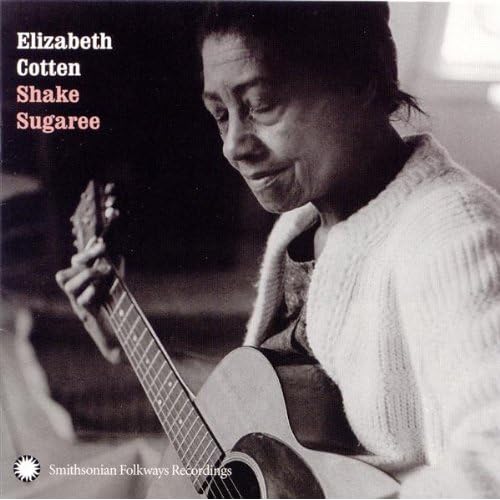 Elizabeth Cotten - Shake Sugaree (1965). Utterly delightful album by the fingerstyle guitarist with her daughter singing on a few tracks. I prefer Cotten's own aged voice, but her daughter sang beautifully. Many tracks are instrumentals, showing off that often-imitated-but-rarely-matched Cotten picking. There's also a few tracks with Cotten on banjo, where her style translates to something quite similar to that of Dock Boggs.
Elizabeth Cotten - Shake Sugaree (1965). Utterly delightful album by the fingerstyle guitarist with her daughter singing on a few tracks. I prefer Cotten's own aged voice, but her daughter sang beautifully. Many tracks are instrumentals, showing off that often-imitated-but-rarely-matched Cotten picking. There's also a few tracks with Cotten on banjo, where her style translates to something quite similar to that of Dock Boggs. The Fall - Country On The Click (2003) and The Fall Vs. 2003 EP (2003). The former of these is the early version of the album eventually titled The Real New Fall LP, which was released in 2004. This one was leaked to the Internet early and contains some early mixes of the songs (only three are the same). You can read about the differences on the Wikipedia page. I quite like The Real New Fall LP, but I like these alternate versions, too. The Fall Vs. 2003 EP has a song from Country On The Click and the reworked, renamed version from The Real New Fall LP, and is thus totally redundant for my collection.
The Fall - Country On The Click (2003) and The Fall Vs. 2003 EP (2003). The former of these is the early version of the album eventually titled The Real New Fall LP, which was released in 2004. This one was leaked to the Internet early and contains some early mixes of the songs (only three are the same). You can read about the differences on the Wikipedia page. I quite like The Real New Fall LP, but I like these alternate versions, too. The Fall Vs. 2003 EP has a song from Country On The Click and the reworked, renamed version from The Real New Fall LP, and is thus totally redundant for my collection.





